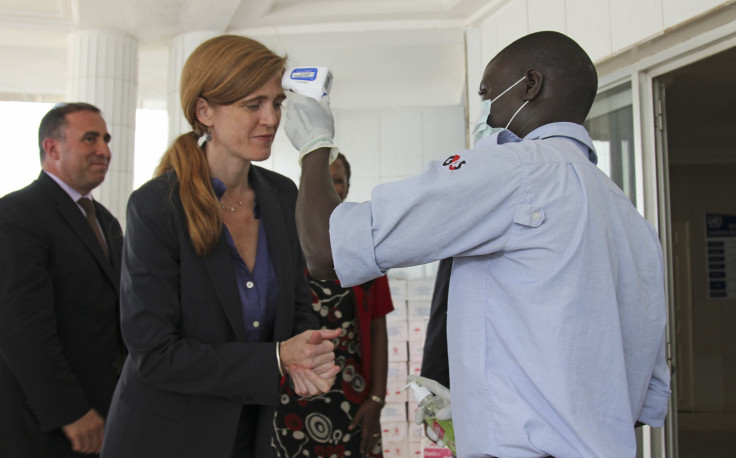US Ambassador To The UN Samantha Power Travels To West Africa In The Wake Of Ebola Quarantine Moves By 3 States

(Reuters) -- As the U.S. ambassador to the United Nations embarked on a trip to West Africa, new rules in three U.S. states mandating quarantine for health workers returning from the Ebola-stricken region drew criticism, even as some U.S. lawmakers called for a travel ban on the three worst-hit countries.
Samantha Power, a member of President Barack Obama’s cabinet, left Washington Saturday bound for Guinea, Liberia and Sierra Leone. Obama has resisted Republican calls for a travel ban on advice from health officials who say such a measure would be counterproductive.
Along with New York and New Jersey, Illinois has now imposed quarantines for anyone arriving with a risk of having contracted Ebola virus disease in West Africa. But the first person isolated under the new rules called her treatment a “frenzy of disorganization.”
Kaci Hickox, a nurse returning from Sierra Leone, arrived at Newark Liberty International Airport Friday and was questioned by officials clad in protective gear amid what she said was a misdiagnosis of fever, followed by a transfer to a hospital isolation tent. Hickox said she feared for what lies ahead for other U.S. health workers trying to help combat the epidemic that has killed thousands in West Africa.
‘Frenzy Of Disorganization’
“Will they be made to feel like criminals and prisoners?” she wrote in an article published by the Dallas Morning News on its website Saturday. “I am scared that, like me, they will arrive and see a frenzy of disorganization, fear and, most frightening, quarantine,” wrote Hickox, who had been working with the charity Doctors Without Borders.
New York and New Jersey imposed 21-day quarantines after a New York City doctor was diagnosed with the disease Thursday, days after returning home from working with patients in Guinea. The physician’s case and the fact he was out and about in the city in the period before his symptoms emerged set off renewed worries in the U.S. about the spread of the disease.
Illinois will now also require a mandatory quarantine of anyone who has had direct contact with Ebola patients in those countries. The quarantines imposed by the three states exceed current U.S. government guidelines, although the Obama administration is discussing similar measures.
Ebola is spread through direct contact with the bodily fluids of an infected person. It is not transmitted by people who are not showing symptoms.
Arrival Treatment Criticized
Hickox’s account of her treatment echoed concerns of critics of the mandatory quarantines who say they could discourage Americans from going to help control the epidemic.
Ebola has killed almost one-half of more than 10,000 people diagnosed with the disease -- predominantly in Guinea, Liberia and Sierra Leone -- although the true toll is far higher, according to the World Health Organization.
Doctors Without Borders has criticized Hickox’s treatment.
New Jersey Gov. Chris Christie, questioned by reporters about the nurse’s complaints, answered that his first obligation was the safety of the people of New Jersey. “Inconvenience that could occur from having folks that are symptomatic and ill out amongst the public is a much, much greater concern of mine,” he said.
(Reporting by Jonathan Allen; Additional reporting by Barbara Goldberg, Natasja Sheriff and Yasmeen Abutaleb in New York; Writing by Edwin Chan; Editing by Chris Michaud and Richard Borsuk)
© Copyright Thomson Reuters {{Year}}. All rights reserved.





















